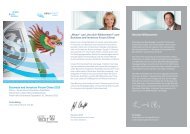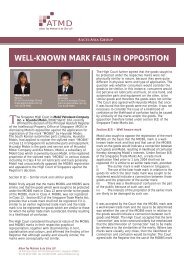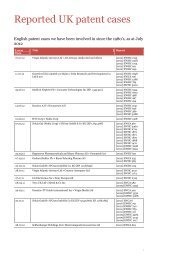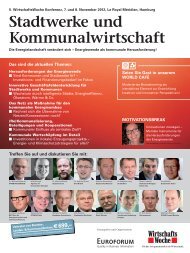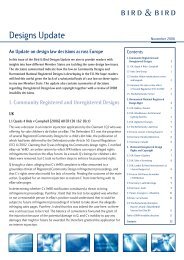Here - Bird & Bird
Here - Bird & Bird
Here - Bird & Bird
Create successful ePaper yourself
Turn your PDF publications into a flip-book with our unique Google optimized e-Paper software.
558 European Intellectual Property Review<br />
cause’ need to be assessed separately, and are not<br />
implied in the taking of commercial advantage as<br />
such.”<br />
And finally, a wider question to consider is as follows.<br />
Is it time to harmonise the laws of unfair<br />
competition in the European Union?<br />
The controversy of L’Oréal v Bellure has, as Jacob L.J.<br />
noted, at its heart the relationship between trade mark<br />
and competition law. It has for the first time brought rights<br />
akin to those protected by the law of unfair competition,<br />
until now confined to continental Europe, across the<br />
Channel into the United Kingdom. It is likely, without<br />
harmonisation of unfair competition laws, that the L’Oreal<br />
v Bellure ruling will be interpreted and applied, in<br />
particular in relation to what is an “unfair advantage”,<br />
according to the laws of parasitical trading, slavish<br />
copying and other unfair competition law concepts as<br />
these are understood in the relevant European Member<br />
States. Indeed it is interesting to note that many of the<br />
terms discussed in the case law of the CFEU, such as<br />
parasitism, tarnishment, blurring and “riding on the coat<br />
tails”, which are not English law concepts, are not set out<br />
in the literal wording of the legislation as currently<br />
enacted. On the other hand concepts such as “unfair<br />
advantage” and “without due cause” which do appear in<br />
the legislation are typically not discussed in detail or at<br />
all.<br />
It is also likely, as has apparently already happened<br />
that the United Kingdom, a jurisdiction which has until<br />
now not had an unfair competition law, will interpret the<br />
ruling in as restrictive a way as possible, for example by<br />
requiring the element of intention to take an unfair<br />
advantage. As well as reforming or clarifying trade mark<br />
law in Europe, perhaps there is a need to consider<br />
harmonising national laws of unfair competition. In this<br />
way it should also be possible to circumscribe what is<br />
“fair competition” and ensure that acts falling within this<br />
category are not adjudged to take “unfair advantage” of<br />
a mark with a reputation in the context of trade mark law.<br />
The Max Planck Study may have paved the way for<br />
such an approach by recommending that unregistered<br />
well-known trade marks having a reputation should be<br />
accorded the same protection as that accorded to<br />
registered trade marks. However any legislative changes<br />
which are proposed by the Commission later in 2011 on<br />
the basis of the Max Planck Study recommendations are<br />
realistically not likely to include anything so far-reaching<br />
in scope. It is to be hoped that nevertheless the proposals<br />
for new legislation will grasp this important opportunity<br />
to provide us with a clearer, more internally consistent<br />
and comprehensive European trade mark law.<br />
[2011] E.I.P.R., Issue 9 © 2011 Thomson Reuters (Professional) UK Limited and Contributors



